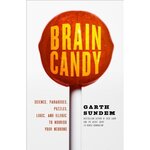
Imagine you wanted to predict when sheep would chew. (Don't ask why...just imagine.) Here's how you would do it: attach speakers to the tops of sheep heads to broadcast chewing sounds. Collect chewing sounds and their times in a massive database. Feed these data into a neural net, which would recognize input (times) and output (chewing or not chewing) and eventually learn to predict when one leads to the other.
This is what neural nets do: they predict the future by quantifying the past.
A relatively simple example of this in the brain is the hippocampus. Electrical signals go in one end…

